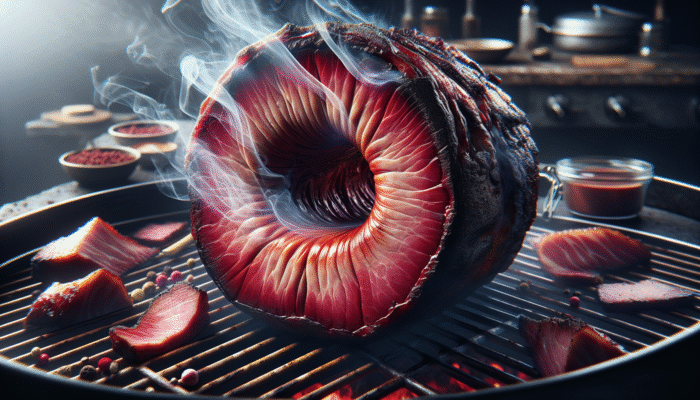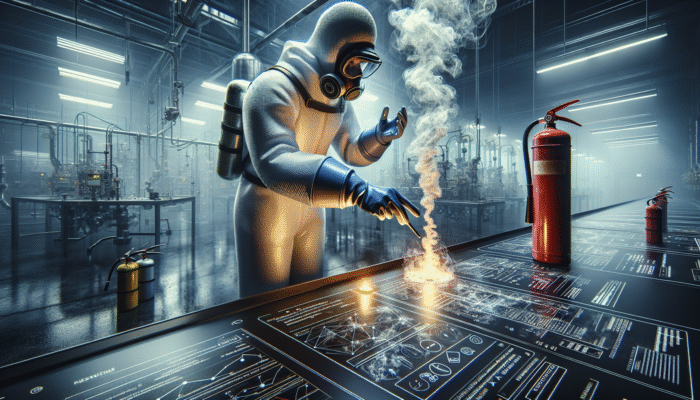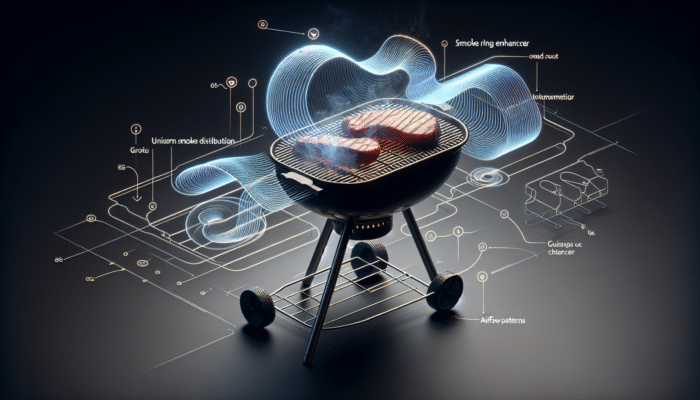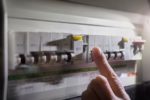Unlocking the Secrets of Smoke Ring Enhancers for the Ultimate Barbecue Experience
Understanding the Functionality of a Smoke Ring Enhancer

A smoke ring enhancer is a cutting-edge tool meticulously designed to create impressive smoke ring effects while grilling. This enhancement not only elevates the visual appeal of barbecued meats but also amplifies the flavor profile, delivering the rich, smoky essence that barbecue lovers crave. The science behind achieving a smoke ring is intricately tied to the processes of combustion and smoke generation. When applied correctly, these enhancers can ensure a consistent flow of smoke, resulting in that hallmark ring enveloping the meat, which is often seen as a hallmark of expertly smoked barbecue.
At its core, a smoke ring comprises a chemical reaction initiated by the interaction of smoke with the proteins in the meat. The enhancer optimizes the circulation of smoke, allowing for uniform smoke distribution around the meat. This leads to not just a visually appealing product but also one that is packed with flavor. By enhancing smoke penetration and improving cooking efficiency, a smoke ring enhancer empowers both novice and experienced grillers to achieve professional-grade results right from their own backyard.
Within the diverse and vibrant barbecue culture of the United States, utilizing a smoke ring enhancer can significantly impact how your dish is perceived. Many barbecue competitions and enthusiasts prioritize both the aesthetic and flavor of their smoked meats, making these devices increasingly popular among grilling aficionados. Whether you are hosting an energetic cookout in Texas or a laid-back barbecue in California, a well-executed smoke ring can elevate your dish, leaving a memorable impression on friends and family alike.
Diving into the Different Types of Smoke Ring Enhancers on the Market
The variety of smoke ring enhancers available for purchase is extensive, showcasing a range of devices tailored to accommodate various smoking methods and personal preferences. Generally, these devices can be categorized into simple attachments and more sophisticated systems designed for professional use.
Basic smoke ring enhancers often take the form of attachments that can be easily affixed to grills or smokers. These devices typically include a chamber where wood chips can ignite and smolder, generating smoke that is channeled into the cooking area. Such models are user-friendly, making them ideal for beginners. They facilitate easier management of smoke without requiring a deep understanding of barbecuing techniques.
On the other hand, advanced smoke ring enhancers can incorporate electric or automated systems. These often feature multiple temperature and smoke production settings, allowing cooks to achieve precise results. Such advanced systems are particularly beneficial for serious barbecue enthusiasts or professionals who demand consistent, high-quality results across various cuts of meat.
Additionally, some enhancers come equipped with adjustable vents or customizable smoke intensity controls, enabling users to tailor smoke levels to fit different meats and personal taste preferences. For instance, brisket and ribs may perform better with a more intense smoke profile, whereas chicken may benefit from a lighter touch. This adaptability makes smoke ring enhancers a valuable investment for anyone looking to refine their barbecuing skills.
The Multifaceted Benefits of Using a Smoke Ring Enhancer
The advantages of employing a smoke ring enhancer extend well beyond just visual appeal. When used effectively, these devices can enhance the flavor, tenderness, and overall quality of barbecued meats. One of the most significant benefits is the depth of flavor that evenly distributed smoke imparts. The smoke rings that form around the meat not only signify a well-smoked product but also indicate that the meat has absorbed a wider variety of smoky flavors.
In addition, smoke ring enhancers can greatly improve cooking efficiency. With enhanced smoke circulation, meats can cook more evenly, reducing the risk of overcooked edges or undercooked centers. This is particularly crucial when handling larger cuts of meat, such as briskets or pork shoulders, which require extended cooking times to reach optimal doneness.
For barbecue enthusiasts in the U.S., the visual charm of a pronounced smoke ring is also a point of pride. Many grilling competitions and casual gatherings place a high value on presentation. A beautifully developed smoke ring can transform an ordinary meal into a visual masterpiece, capturing the attention and admiration of guests.
Furthermore, by utilizing a smoke ring enhancer, cooks can experiment with different types of wood to create unique flavors. The ability to combine various smoking woods, such as hickory, mesquite, or applewood, can result in a wide array of taste experiences, further enriching the barbecue journey. For those who appreciate not just the flavor but also the craft of barbecuing, a smoke ring enhancer becomes an essential tool in their culinary toolkit.
Critical Safety Protocols for Utilizing Smoke Ring Enhancers

Carefully Reviewing the Manufacturer's Guidelines
Before embarking on your adventure with a smoke ring enhancer, it is imperative to familiarize yourself with the manufacturer's guidelines. These manuals offer essential guidance specific to your model, ensuring both safe operation and optimal performance. Ignoring these instructions may lead to improper use, which could result in accidents, injuries, or damage to the device.
Understanding the various settings, features, and functionalities outlined in the manual can greatly enrich your grilling experience. For instance, some enhancers may require specific types of fuel or wood chips, while others may have unique ventilation needs. Being well-acquainted with these details can help you avoid common pitfalls that many novice grillers face, such as unexpected flare-ups or inconsistent smoke production.
Moreover, reading the manual can also provide troubleshooting tips and maintenance advice, which can assist in prolonging the lifespan of your smoke ring enhancer. In the world of barbecuing, knowledge and safety go hand in hand. Properly understanding how to operate your smoke ring enhancer empowers you to create delicious dishes while minimizing risks associated with grilling.
Conducting Thorough Inspections for Damage
Before utilizing your smoke ring enhancer, it is crucial to perform a comprehensive inspection for any signs of wear or damage. This often-overlooked step is key to ensuring both safety and performance. Carefully examining the device for cracks, loose fittings, or other forms of damage can help prevent malfunctions that could compromise your overall cooking experience.
For example, a cracked chamber may lead to uneven smoke distribution or even hazardous leaks. Loose components can create unstable operation, increasing the risk of burns or fires. By dedicating time to inspect your enhancer before each use, you not only protect the integrity of your food but also ensure the safety of yourself and those around you.
Regular inspections also allow you to monitor the overall condition and longevity of your device. If you notice any issues, address them immediately by repairing or replacing parts as necessary. This proactive approach enhances both the safety and efficiency of your smoke ring enhancer, ensuring that every barbecue session is a successful one.
Positioning for Optimal Performance

The placement of your smoke ring enhancer on the grill or smoker is crucial for ensuring a safe and effective cooking process. Incorrect positioning can lead to hazards such as flare-ups or inadequate smoke circulation, adversely affecting your grilling results. It's essential to follow the guidelines stated in the manual regarding placement to ensure optimal smoke production and heat distribution.
When positioning the enhancer, take into account the heat source and airflow patterns within your grill. Ideally, the enhancer should be placed where it can produce and deliver smoke evenly around the meat. This often means positioning it near the heat source but not directly over it, allowing for a more controlled smoke environment.
Additionally, ensure that the enhancer is stable and secure to prevent it from tipping over during use. An unstable setup can lead to accidents, such as spilling hot wood chips or igniting flare-ups. By carefully positioning your smoke ring enhancer, you can create a safer cooking environment that maximizes both flavor and safety.
Wearing Essential Protective Gear
Grilling involves high temperatures and the potential for splatter, making it crucial to wear appropriate protective gear when operating a smoke ring enhancer. Heat-resistant gloves and aprons serve as your first line of defense against burns or injuries while using the device. The unpredictable nature of grilling, coupled with the high temperatures involved, necessitates the use of safety equipment to ensure you can focus on crafting delicious barbecue without compromising your personal safety.
Heat-resistant gloves provide essential grip and protection, allowing you to handle hot components or adjust meat without risking burns. When it comes to aprons, opting for flame-retardant material can provide an additional layer of safety, especially when working with open flames. This precaution can make the difference between an enjoyable grilling experience and a painful mishap.
Furthermore, consider wearing closed-toe shoes and securing long hair to minimize the risk of accidents in the grilling area. Utilizing protective gear ensures that you can immerse yourself in the cooking process without worrying about potential injuries or accidents, allowing you to concentrate on achieving the perfect smoke ring and delightful flavors.
Addressing Ventilation Needs
Ventilation is often an overlooked yet vital aspect of using a smoke ring enhancer safely. Adequate airflow helps prevent the buildup of smoke and fumes, which can pose health risks in confined spaces. When smoking meats, especially indoors or in a garage, it is essential to ensure that your cooking area is well-ventilated to allow the smoke to dissipate effectively.
If using the enhancer outdoors, choose a location that benefits from natural airflow. Positioning the grill to allow wind to carry smoke away from your cooking area is ideal. For those employing an indoor smoker, consider using exhaust fans or opening windows to maintain a safe environment.
Additionally, comprehending the smoke production levels from your enhancer is crucial. Different woods or smoking methods may produce varying levels of smoke, making it essential to monitor smoke levels and adjust ventilation as needed. This practice not only contributes to a safer cooking environment but also enhances the overall quality of the barbecue, ensuring that flavors are not overwhelmed by excessive smoke.
Practicing Safe Operation Techniques
Mastering Temperature Management for Superior Results
Effective temperature control is fundamental when using a smoke ring enhancer safely. Maintaining appropriate cooking temperatures not only ensures that the enhancer operates optimally but also prevents overheating risks that could lead to safety hazards. Each type of meat requires a specific cooking temperature, and understanding these requirements can help you achieve the desired smoke ring effect while prioritizing safety.
For instance, low-and-slow smoking techniques often necessitate maintaining temperatures between 225°F and 250°F. These temperatures allow for the perfect infusion of smoke flavor without overcooking or drying out the meat. Utilizing a digital thermometer can help you monitor the internal temperature of both the meat and the grill, providing real-time data to ensure everything remains within a safe cooking range.
Moreover, some smoke ring enhancers come equipped with built-in temperature controls or indicators, allowing you to monitor smoke production more effectively. Failing to maintain proper temperature could lead to burnt meat or inefficient smoke production, disrupting your cooking process. Therefore, investing in a quality thermometer and consistently monitoring the grill's temperature can enhance safety while improving your overall barbecue outcomes.
Vigilantly Observing Smoke Production Levels
Keeping a close watch on smoke production is crucial when using a smoke ring enhancer safely. Excessive smoke levels can lead to health risks, such as inhalation of harmful compounds or an overpowering smoke flavor in the meat. Understanding the right amount of smoke required for different meats is essential for striking a balance between flavor and safety.
For most cuts, a thin blue smoke is ideal for effective smoking. This type of smoke signifies that the wood is smoldering at an appropriate rate, releasing flavor without producing harmful byproducts. Conversely, thick white smoke can indicate incomplete combustion, potentially imparting bitter flavors and introducing undesirable chemicals into your food.
To manage smoke levels effectively, experiment with different types of wood and smoking techniques. For instance, fruit woods like apple or cherry yield a milder smoke, which may be preferable for poultry, whereas hickory or mesquite can provide a more robust flavor for beef or pork. Additionally, adjusting airflow in your grill and the positioning of the smoke ring enhancer can fine-tune smoke production, leading to the perfect smoke ring while ensuring a safe cooking environment.
Preventing Dangerous Flare-Ups During Grilling
Flare-ups can pose one of the most dangerous aspects of grilling, particularly when using a smoke ring enhancer. These sudden bursts of flame typically occur due to grease or fat dripping onto the heat source, posing significant hazards. To mitigate the risk of flare-ups, it's essential to use your smoke ring enhancer thoughtfully and adhere to proper cooking techniques.
One effective strategy is to monitor the fat content of the meats being prepared. Trimming excess fat can help reduce the likelihood of flare-ups while still preserving flavor and moisture during cooking. Additionally, consider the placement of both the smoke ring enhancer and the meat itself. Positioning meats away from the direct heat source can decrease the chances of fat igniting and causing a flare-up.
Another technique involves managing the grill's temperature. By avoiding excessively high heat levels, you can lower the risk of flare-ups occurring. If a flare-up does occur, stay calm and avoid dousing it with water, as this can cause steam burns and worsen the situation. Instead, use a spatula to move the meat away from the flames and let the fire subside naturally. Practicing these techniques will help ensure a safer grilling experience while enhancing the quality of your barbecue.
Ensuring Proper Maintenance and Cleaning of Your Smoke Ring Enhancer
Committing to Consistent Cleaning Routines
After each use, dedicating time to clean your smoke ring enhancer is crucial for ensuring its longevity and safe operation. Residue buildup can impair performance, leading to uneven smoke distribution and potentially unsafe cooking conditions. Regular cleaning not only enhances flavor but also reduces the risk of flare-ups caused by accumulated grease and debris.
To clean the enhancer, begin by allowing it to cool completely. Once cooled, disassemble any removable components and wash them thoroughly with warm, soapy water. For stubborn residue, a soft brush or sponge can assist in scrubbing away buildup without damaging the device. After cleaning, ensure that all parts are completely dried before reassembling to prevent moisture-related issues.
In addition to routine cleaning, consider performing a deep clean at the end of the grilling season. This entails a comprehensive inspection and cleaning of all components, checking for signs of wear, and replacing any damaged parts. This proactive approach ensures that your smoke ring enhancer remains in peak condition for years to come, providing you with perfectly smoked meats every time you fire up the grill.
Conducting Regular Component Inspections
A well-maintained smoke ring enhancer is essential for effective and safe grilling. Regularly inspecting all components can help identify signs of wear or damage that could compromise performance or safety. This includes checking hoses, connections, and the smoke chamber for cracks, leaks, or other potential issues.
Inspecting the components after each use allows you to catch problems early, preventing potential accidents before they arise. For instance, a small crack in the smoke chamber can lead to inefficient smoke production or hazardous smoke leaks. By routinely examining your enhancer, you can replace or repair damaged parts and keep your device functioning optimally.
Besides immediate concerns, consider the overall condition of the smoke ring enhancer as it ages. Like any grilling equipment, wear and tear are unavoidable over time. By being proactive in your inspections, you can ensure that your smoke ring enhancer remains a reliable tool in your grilling arsenal for many barbecues to come.
Implementing Smart Storage Solutions
Proper storage of your smoke ring enhancer is vital for maintaining its condition and functionality. After cleaning and inspecting the device, store it in a dry, secure location to prevent damage from moisture, pests, or physical impacts. Ideally, keep the enhancer in a protective case or secure container to shield it from external elements that could compromise its performance.
When storing the enhancer, ensure it is completely dry to avoid rust or mold development. Additionally, consider storing it alongside other grilling accessories to guarantee you have everything you need for your next barbecue session. This practice not only keeps your grilling space organized but also reduces the chances of misplacing essential components.
For those living in areas with extreme temperatures, consider bringing the enhancer indoors during colder months to prevent weather-related damage. By following these simple storage precautions, you can extend the lifespan of your smoke ring enhancer, ensuring that it remains a dependable companion for many future cooking adventures.
Addressing Common Troubleshooting Challenges
Resolving Issues with Inconsistent Smoke Ring Formation
Encountering inconsistent smoke rings can be frustrating, especially after investing effort into creating a perfectly smoked dish. This issue can arise from various factors, including uneven smoke distribution, improper temperature management, or even challenges with air circulation. Addressing these concerns can help improve your results and elevate the overall quality of your barbecued meats.
First, evaluate the placement of your smoke ring enhancer. If it’s not positioned correctly concerning the heat source, it may fail to generate smoke evenly around the meat. Experimenting with its placement can lead to better smoke flow and more consistent smoke rings. Additionally, ensure that the wood chips or pellets used in the enhancer are fresh and high quality, as old or damp wood can hinder smoke production.
Monitoring the temperature is another critical aspect. If the grill is too hot or not hot enough, it can affect smoke ring formation. Ideally, you want to maintain a consistent temperature conducive to smoke production, typically between 225°F and 250°F. By adjusting your grill's temperature and the position of the smoke ring enhancer, you can achieve more reliable smoke ring results.
Addressing Overheating Concerns
If your smoke ring enhancer is overheating, it can pose serious safety risks and adversely affect your cooking outcomes. Recognizing the signs of overheating is vital, as it can lead to burnt food or potentially hazardous situations. First, closely monitor the temperature during use and be aware of any unusual fluctuations.
When an enhancer overheats, the wood inside can ignite instead of smoldering, producing harsh, acrid smoke. If this occurs, immediately turn off the grill and allow both the enhancer and grill to cool down before troubleshooting. Ensure that your grill's air intake and exhaust settings are properly configured, as improper airflow can contribute to overheating.
If you frequently encounter overheating issues, consider adjusting the quantity of fuel or wood you’re using in the enhancer. Additionally, inspect the device for any signs of damage or blockages that may impede airflow. By addressing these factors, you can maintain a safe cooking temperature and achieve the desired smoke ring results.
Identifying and Rectifying Smoke Leaks
Smoke leaks in a smoke ring enhancer can lead to ineffective smoke production and pose safety risks. Identifying and addressing these leaks promptly is essential to ensuring both performance and safety during your grilling sessions. Start by inspecting all connections and seals for any signs of gaps or damage that may allow smoke to escape.
If you detect any leaks, check for loose fittings or broken components that may need replacing. Tightening connections or applying high-temperature sealant can help create a more airtight seal. Additionally, ensure that the enhancer is positioned securely on the grill to minimize the risk of movement that could lead to leaks during use.
Monitoring smoke levels and patterns during cooking can also assist in identifying potential leakage issues. If smoke escapes from unexpected areas, take the time to troubleshoot the problem before continuing with your grilling. Addressing smoke leaks not only enhances the performance of your smoke ring enhancer but also contributes to a safer grilling environment.
Achieving Even Heat Distribution
Uneven heat distribution can significantly affect your cooking results when using a smoke ring enhancer. This issue may lead to some parts of the meat being overcooked while others remain undercooked, ultimately impacting the overall quality of your barbecue. To resolve this issue, start by examining your grill’s burners and heat deflectors.
Adjusting the grill's burners can help achieve a more uniform cooking temperature across the cooking surface. If using a charcoal grill, ensure that the charcoal is evenly distributed, and consider utilizing a heat deflector to promote consistent heat circulation. Additionally, you can rotate your meat during the cooking process to ensure even exposure to heat and smoke.
Moreover, consider the size and placement of the meat itself. Larger cuts may require additional attention to ensure even cooking, so positioning them correctly in relation to the heat source can make a significant difference. By implementing these steps, you can enhance heat distribution and achieve deliciously smoked meats adorned with perfect smoke rings.
Enhancing Your Barbecue Experience
Experimenting with Flavor Combinations
One of the most exciting aspects of using a smoke ring enhancer is the opportunity to experiment with different flavors to create unique taste profiles. Various types of wood not only impart distinct flavors but can also elevate the overall experience of barbecued dishes. For example, fruit woods like cherry or peach can lend a sweetness, while robust woods like hickory or mesquite deliver deeper, more intense flavors.
Taking the time to explore various wood combinations can unlock a wealth of flavor possibilities. Mixing woods can create a more complex smoking profile that perfectly complements specific meats. For instance, blending applewood with hickory may yield a harmonious balance of sweetness and smokiness, making it an excellent choice for pork or chicken.
Don’t hesitate to incorporate additional flavorings such as herbs, spices, or marinades into your smoking process. Brining meats in flavorful solutions can help enhance moisture and flavor during cooking. By experimenting with different combinations, you can discover new favorite profiles and elevate your barbecue experience to new heights.
Planning Unforgettable Barbecue Gatherings
Impressing guests with flawlessly smoked meats is effortless when using a smoke ring enhancer. Whether it’s a casual family gathering or a more formal BBQ event, showcasing your barbecue skills can elevate the occasion. When hosting, consider selecting a variety of meats that highlight the capabilities of your smoke ring enhancer, such as brisket, ribs, or pork shoulder.
Additionally, prepare in advance to ensure a seamless grilling experience. Pre-seasoning your meats and having all necessary tools and ingredients ready can help you manage the grilling process efficiently. Be sure to cultivate a welcoming atmosphere by engaging with your guests while simultaneously keeping a watchful eye on the grill.
Creating a menu that includes a variety of sides and sauces to complement your smoked meats can also enhance the overall dining experience. Whether it’s classic barbecue sides like coleslaw and baked beans or innovative creations, a well-rounded meal will leave a lasting impression on your guests. By mastering the art of barbecue with a smoke ring enhancer, you can delight your taste buds and create unforgettable memories with family and friends.
Sharing Your Barbecue Expertise and Techniques
One of the most gratifying aspects of barbecuing is sharing your knowledge and experiences with fellow enthusiasts. By educating others on the safe use of a smoke ring enhancer, you can help improve their skills and elevate their barbecue game. Consider hosting workshops or informal grilling sessions where you can demonstrate techniques and share insights into achieving the perfect smoke ring.
Social media also serves as a fantastic platform for sharing tips and techniques with a broader audience. Posting photos of your beautifully smoked meats, along with helpful hints or recipes, can inspire others to try their hand at barbecuing with a smoke ring enhancer. Engaging with online barbecue communities can foster a sense of camaraderie and collective learning, as enthusiasts exchange ideas and experiences.
Additionally, consider creating a blog or video series dedicated to barbecue techniques. Through these channels, you can delve deeper into various aspects of barbecuing, from equipment tips to advanced smoking methods. This not only positions you as a knowledgeable resource but also allows you to connect with fellow barbecue lovers and share your passion for this cherished culinary tradition.
Exploring Advanced Smoking Techniques
As you become more skilled with your smoke ring enhancer, venturing into advanced smoking techniques can elevate your barbecuing abilities to new heights. Methods such as cold smoking, reverse searing, or even incorporating sous-vide techniques can yield extraordinary results that impress even the most discerning barbecue connoisseurs.
Cold smoking is an intriguing approach that infuses smoke flavor into meats without cooking them. This method requires meticulous temperature management but can yield exceptional results for items like salmon or cheese. Pairing cold smoking techniques with a smoke ring enhancer can create a unique combination that enhances flavors.
Reverse searing is another advanced technique that involves slow-cooking a piece of meat before finishing it over high heat. This method ensures even cooking and can enhance the development of smoke rings. By mastering these advanced techniques, you can elevate your barbecue game and become the go-to grill master for friends and family.
Frequently Asked Questions About Smoke Ring Enhancers
What is a smoke ring enhancer?
A smoke ring enhancer is a specialized device used in barbecuing to improve smoke distribution and create visually appealing smoke rings around meats, significantly enhancing both flavor and presentation.
What are the safety precautions for using a smoke ring enhancer?
To ensure the safe use of a smoke ring enhancer, read the manufacturer's manual, check for damage, ensure proper placement, wear protective gear, and maintain adequate ventilation while cooking to prevent hazards.
Can I use any type of wood with a smoke ring enhancer?
Yes, various types of wood can be utilized with a smoke ring enhancer. Different woods impart distinct flavors, allowing for customization based on personal preferences and the type of meat being smoked.
How frequently should I clean my smoke ring enhancer?
It is advisable to clean your smoke ring enhancer after each use to prevent residue buildup and ensure optimal performance. Performing a comprehensive cleaning at the end of the grilling season is also highly recommended.
What should I do if I notice smoke leaks?
If you detect smoke leaks, inspect the enhancer for any gaps or loose fittings. Tighten connections or replace damaged parts to ensure effective smoke production and maintain safety while using the enhancer.
Is it safe to use a smoke ring enhancer indoors?
While some smoke ring enhancers are suitable for indoor use, it is essential to ensure proper ventilation to prevent smoke accumulation. Generally, it is safer to use them outdoors.
What common issues might arise when using a smoke ring enhancer?
Common issues include inconsistent smoke rings, overheating, smoke leaks, and uneven heat distribution. Identifying and addressing these problems can significantly improve your results.
How can I achieve the best smoke rings?
To achieve the finest smoke rings, maintain consistent low temperatures, ensure even smoke distribution, utilize quality wood, and adjust the enhancer and meat placement as necessary.
Can a smoke ring enhancer enhance flavor?
Absolutely, a smoke ring enhancer can significantly improve flavor by enhancing smoke penetration and allowing for a more consistent infusion of smokiness throughout the meat.
What should I consider when hosting a barbecue featuring a smoke ring enhancer?
When hosting a barbecue, plan your menu in advance, prepare meats thoroughly, engage with your guests, and ensure all grilling equipment is in peak condition for a successful smoking experience.
Connect with us on Facebook!
The Article Using a Smoke Ring Enhancer Safely: A Guide appeared first on https://pitmastersarsenal.com





Comments are closed